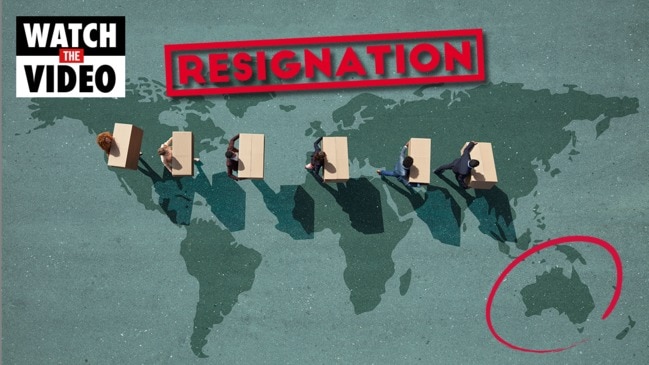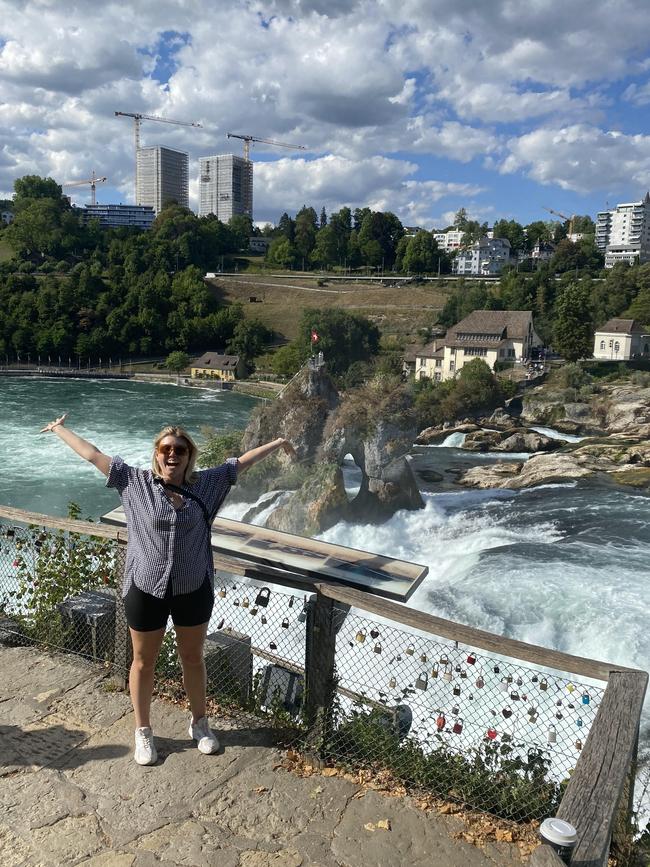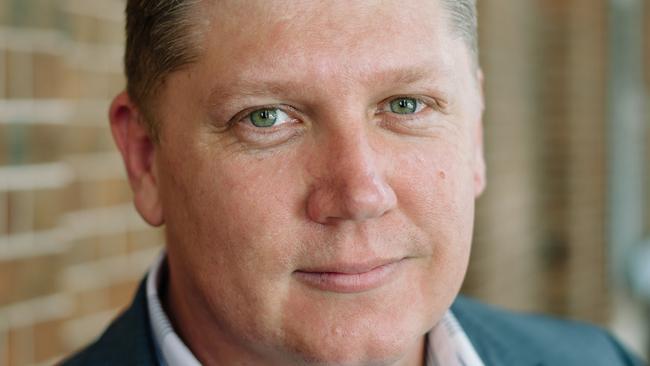How the ‘quiet quitting’ trend will play out as Aussie woman travels world on just $2500
The “quiet quitting” trend has gained momentum around the world and it’s going to have a huge influence on the future of work.

At Work
Don't miss out on the headlines from At Work. Followed categories will be added to My News.
Leah Tindale is able to travel the world earning on average just $2500 a month.
The 33-year-old went through a divorce last year and then was trapped in Western Australia as a result of its brutal border closures during the pandemic.
But since leaving Perth in May, she has spent six weeks in London, five weeks in Germany and is currently working on the island of Crete in Greece.
She is part of the growing trend of digital nomads who are able to work and travel the world at the same time.
Since the pandemic hit, there has been an increased appetite for a ‘work anywhere’ or borderless work model, according to behavioural scientist Aaron McEwan from global research and advisory firm Gartner.
He predicts approximately 5 per cent of companies will adopt a borderless model – and this is where the competition for the “hottest talent and coolest jobs” will take place.
Want to stream your news? Flash lets you stream 25+ news channels in 1 place. New to Flash? Try 1 month free. Offer ends 31 October, 2022 >

Ms Tindale already shunned the hustle of working for someone else and started her business called Lip Studios as a podcast producer.
She averages about five hours work a day while she travels the world.
Embracing a lifestyle where she can work and travel at the same time was a no-brainer, she added.
“I don’t have any other commitments. I was divorced last year. I don’t have kids.
“I moved from Sydney back to Perth with pretty much two suitcases and was there for the year and thought what am I doing? I can go anywhere in the world and do this,” she told news.com.au. “Good friends will call and chat to you wherever you are and Covid demonstrated you can keep those friendships alive with FaceTime even if it’s not ideal, so why not?
“It was a now or never situation before getting tied down with mortgages or other bills and someone telling me I am too old and to stop travelling.”
The new breed of digital nomads
The ‘work anywhere’ model will be where the “most exciting” things happen for the future of work as people seek out the digital nomad life, according to Mr McEwan.
But he said digital nomads like Ms Tindale will be less of the norm in the future.
“Most people associate a digital nomad as someone who is single, free, not tied down by any commitments, who sits on a beach in Bali working on their laptop, but that only appeals to a small percentage of the workforce,” he told news.com.au.
Instead there will be people tapping into the ‘quiet quitting’ trend, as well as ‘workcationers’ (where people holiday while still working remotely), new expat models (working remotely while living in another country) and even potential for grey nomads to earn while they travel.
“It’s much more than sitting on a beach with your laptop,” he said.

‘Pretty incredible’
Ms Tindale said she isn’t interested in doing touristy things but instead likes to immerse herself in the world of the locals.
It has meant house and pet-sitting gigs to save money and also renting a flat with other digital nomads to cut down on costs. She has a goal of spending just $70 a day, including accommodation.
The experience so far has given her a deeper insight into various cultures as well as highlighting for her the impact of Russia’s invasion of Ukraine.
“It’s just the incredibly cool and remote places you get to go to because you’re spending more time in a place and not just going to the main cities … Those small discoveries that, when you go on holiday, tend to be limited as it’s about hitting this place and this place and ticking things off, whereas I am relishing each beautiful country,” she said.
“It was also really interesting being in Germany and Europe in general and hearing their opinion of what’s happening in Ukraine. I met a couple of people who have bags packed ready to go and it’s more of a real fear.
“Hearing people’s stories in relation to Australia, we realise we are so small-minded as we have the luxury of closing our eyes to the world sometimes.
“That’s been pretty incredible to feel really connected to the world again.”


Quiet quitting
Part of this digital nomad trend will tie into the quiet quitting phenomenon – which involves the rejection of the idea that work has to take over your life. While quiet quitters still complete all their work competently, it could mean they do things such as ignore work emails and calls outside of work hours and leave the office on time each day.
Quiet quitters will be increasingly looking for a work-anywhere model in a movement that had gained rapid popularity among the younger generations.
“It will be the people who work to live, not live to work and maybe they have got another really important pursuit,” Mr McEwan said.
“It could be being a semi-professional triathlete, musician or artist or pursuing some creative pursuit.
“So they are simply working to fund that lifestyle and that would enable them to travel the world doing particular jobs but enable them to pursue international concerts or competitions,” he said.

Ms Tindale said while climate change makes her concerned about the digital nomad lifestyle, she can also see it’s a growing trend among young people.
“You can already see that with people working from home don’t want the normal nine-to-five, especially young people, and why not?” she said.
“There is not a good enough reason for people to work in an office and work nine-to-five and destroy their souls and why not be free and live to work rather than work to live.”
Another type to embrace the borderless model is the ‘workcationer’ – someone who wants to take a vacation while working at the same time – Mr McEwan said.
“It’s typically a six to 12-month stint for digital nomads, but the workcationer will typically take two weeks to three months to work from a different location or combine a holiday and work,” he said.
“So they will take time off to sit on an island or visit Thailand and will work as well.”

New expat ways
A common digital nomad to emerge in Australia will also be the British expat travelling home to see family while also working.
But it could even replace the expat model entirely in some cases, Mr McEwan predicted, such as people moving to Dubai and living in a “bunker” and their kids going to international school.
“That model was very disruptive on people’s families and children’s education and particularly on the career of partners,” he said.
“The new version of expats could continue to work from Sydney, New York or London but travel from one of these countries for an intense period of six to eight weeks and bring their family and put them in a nice resort, so it’s the benefit of the lifestyle without total disruption of family and careers.”

‘Less glamorous’
But Ms Tindale warns that the digital nomad life is “less glamorous” then might be portrayed on social media.
“The only thing that annoys me is when people have the wrong idea that you don’t do anything. There are always questions om digital nomad groups about, ‘I want to be one and how do I get into it?” she said.
“If you can’t figure how it will work for you, then it’s the wrong thing for you. You have to figure out what industry will work, what you can do remotely, what skills you can do and … you need to be self-sufficient and motivated.”
She added that as a digital nomad you are never “fully resting” either and hostels often aren’t ideal if you need a quiet space to take work calls.
“The biggest thing … is how hard it is to stay in this weird headspace. You’re not on holiday but you’re not necessarily working or having the full routine at home, so it’s quite difficult for the brain sometimes to settle into what you’re doing,” she said.
“You arrive in a place and there are like cool amazing bars and there’s a beach and jetskis and you want to do snorkelling trips but you are also in an apartment and have meetings and need to take calls.
“You can’t just lie on a day bed and read a book and switch off. It’s a weird in-between zone.”

Sometimes eating dinner by yourself is also a “bit lonely” so reaching out on digital nomad Facebook groups for different countries also helps, she advised.
Mr McEwan said there are more countries offering digital nomad visas with around 100 at the moment.
“These are countries that can see they can attract people that bring revenue into their countries. Australia has a real risk we could miss out on this,” he said.
“We already have a skilled worker problem and we are very difficult to get into and look what we have got to offer – beaches, natural beauty, great cuisine, cities. Everything in Australia is set up to be a digital nomad destination.”
Solving the skills shortage
Grey nomads could also play a part in the work anywhere trend, Mr McEwan said, particularly with the labour shortage plaguing the country.
“There’s a whole population of people who don’t want to retire completely but could get in their caravans and travel from town to town and work for fast food companies or retail chains or service stations,” he said.
“They can go to that same company and it’s got an outlet in that particular location and jump in do a few shifts and spend a couple of days and move on to the next town.”

Bye to business trips
However, there could be a fallout from this trend for some workers as many companies have also realised how much money they can save from keeping people in the office rather than sending them on business trips with the additional worry of the carbon footprint.
“I suspect the other thing that will happen is a lot of companies that used to fund business travel will stop funding it,” he said.
“If part of the reason someone went for a company was it gave the option to see the world, it will be increasingly hard to find that in a traditional role, so the option will be to fund the travel themselves but with an organisation that allows it while they are employed.”
But for those businesses pushing for a return to the office full-time, who are meeting “pretty hard” resistance from staff, they are also falling behind the times, Mr McEwan warned.
“The flu season, resurgence of Covid and talk of monkeypox – all those factors have converged to put the brakes on those attempts to coerce people back into offices,” he said.
Originally published as How the ‘quiet quitting’ trend will play out as Aussie woman travels world on just $2500





